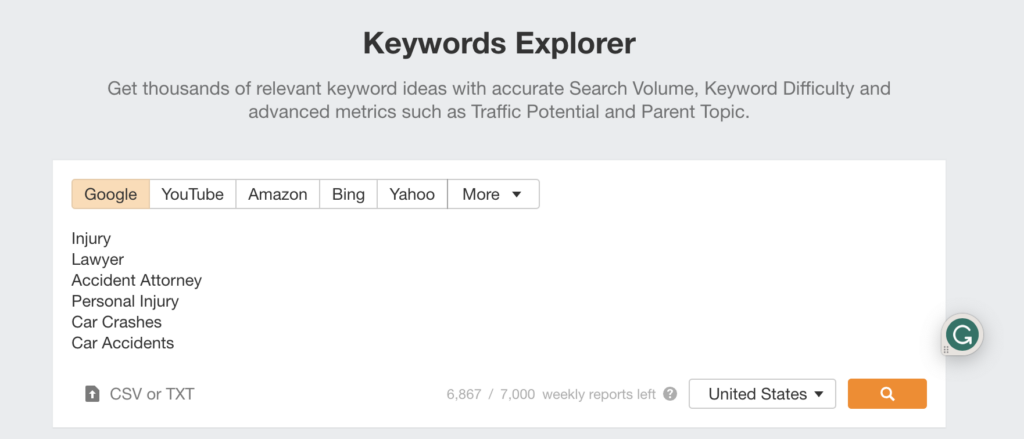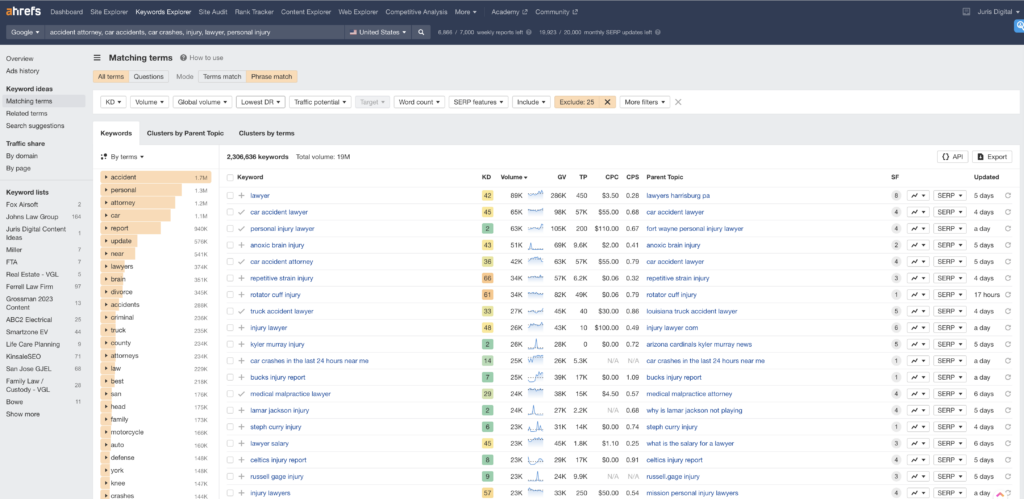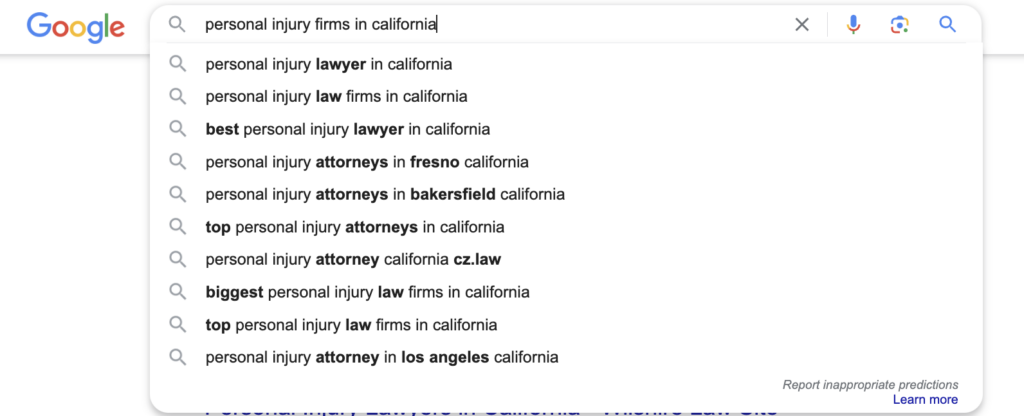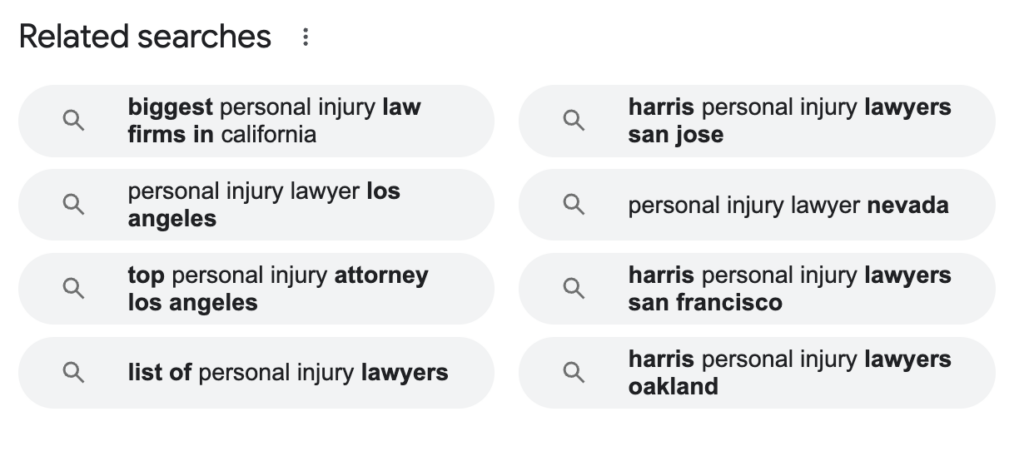What Exactly is Keyword Research?
Keyword research is figuring out the exact words and phrases your potential clients type into search engines.
Why is it Important
It’s important because with the right strategy it helps your website content appear higher on search results pages. That way, more people find your firm above other firms in your market.
But there are some inherent problems with it (mostly on the data side).
The Inherent Problem With Keyword Research
When you think of someone doing SEO do you imagine a nerd (like myself) behind a computer typing away?
You’re not alone.
In fact, many self proclaimed SEO experts come from technical backgrounds. And the problem I see time and time again is I find people who are technically great at SEO… but just bad at actual marketing.
And why does that matter? The purpose is to rank right?
Wrong.
The purpose is to sign more of your better cases (for most of our clients. Your smart goal may be different and that’s ok!)
And ranking high is only half of the battle. The other half and arguably the more important half is understanding your customers needs, pain points, and how you will respond to those.
The Purpose of Keyword Research
I think the purpose of keyword research is to not only find the right keywords that will drive business to your firm, but also to go deep and learn how you can become the go to expert in your market. If you a great job you will build topical authority and be able to generate more of the higher value cases you desire.
Not All Searches Are Created Equal
Good keyword research is the foundation to the success for any effective SEO strategy.
However, all humans are different and therefore may search for the same thing differently online. However normally when a searcher is looking for something they are trying to solve a problem or looking for an answer.
In fact, if someone that resides in Los Angeles, they may type a number of different things to find a personal injury attorney. Here are some examples of these variants.
- Los Angeles Personal Injury Attorney
- Los Angeles Personal Injury Lawyer
- Personal injury law firm
- best injury attorney
- best accident lawyer near me
- personal injury attorney
- Highest rated attorney
Did you know that there are over 1.275 billion unique queries every day on Google and 15% of all Google searches have never been seen before?
How To Do Keyword Research in 2023
Here is how we do keyword research at Juris Digital. This process will give you an idea of what we do for our bespoke local mastery clients.
Step 1: Create a List of Seed Keywords
Think of seed keywords like the main ideas for a personal injury lawyer’s website.
It’s like having a few big signs that point you in the right direction. For a personal injury lawyer, these main ideas or seed keywords could be the big topics they deal with. Examples include:
- Injury
- Lawyer
- Accident Attorney
- Personal Injury
- Car Crashes
- Car Accidents
You want to make this list as exhaustive as possible.
One of the unique ways we do this is for our clients is to access their Google Search Console Data, Callrail Data, and CRM. We feed these reports using advanced data analysis to truly understand the questions potential clients have already asked the firm and data mine the topics they talk about.
We love data – but we love it more when it comes from your ideal customers mouths 🙂
Step 2: Use a Keyword Research Tool like Ahrefs
Go to Ahrefs.com and click on keyword explorer, enter your seed keywords and hit the orange search button.

Step 3: Run a Matching Terms Report and Exclude Irrelevant Searches
Next, you will want to click on Matching Terms on the left. Select phrase match and you will be given a long list of keywords. Millions in fact.
But here is where we start breaking things down.
The devil is in the details here and you can use the exclude function to remove keywords that are not matches for your smart goals.
Use the include filter to only include keywords that match ones important to you (accident, injury + lawyer, etc.)
Make sure to take advantage of searches and use an asterisk to include plural keywords.
Example: Attorney* will show results for Attorney & Attorneys.
Pro Tip: Use law*, attorn* to include lawyer, lawyers, law firm, attorney, attorneys, etc.

Step 4: Narrow The List & Export to CSV
After you have spent some time with the filters you need to narrow down the list to keywords that you think your potential clients will actually be searching.
Don’t limit yourself to just the head keywords like:
- Car Accident Attorney
- Brain Injury Lawyer
Instead also include long tail keywords and tool the content on those pages for where they are at in the buyers journey.
After you are confident you have a great list – export the data as a CSV.
Step 5: Collect More Data
Keyword tools provide a lot of data, but who else has access to this exact same data? Every other SEO on the planet that pays for a subscription. That’s why we like to dive deeper before we consolidate this into topic clusters for our website.
Get Search Console Data
Go to Queries > Max Rows > Export to get a list of keywords your site already ranks for.

This is the minimum data set we recommend working with. But we will talk about ways you can go deeper later in this article which will help you become the true topical authority.
Step 6: Create Topic Clusters
Topic clusters for SEO in the context of a criminal defense law firm work by organizing the firm’s website content into related groups, focusing on various aspects of criminal defense law.
Think of your law firm’s website like a textbook on criminal defense. In this textbook, each chapter (or cluster) covers a different area of criminal defense law.
The main chapter, or the “pillar content,” is a comprehensive page on the website that provides a broad overview of criminal defense services. For example, it could be a detailed guide titled “Understanding Criminal Defense.” Around this main chapter, you then create smaller, related articles or blog posts.
These could be about specific types of criminal cases the firm handles, like DUI defense, assault charges, drug offenses, white-collar crimes, etc.
Each of these smaller pieces is like a section in the chapter, diving into specific details of each case type. They all link back to the main pillar content and to each other.
This setup helps search engines understand that your main pillar content is a thorough and authoritative source on criminal defense law. It’s as if you’re showing that your main chapter covers everything one needs to know about criminal defense because it’s connected to all these specific, related topics.
By using this method, the law firm’s website becomes more organized and easier for search engines to understand. It also helps demonstrate the firm’s expertise in various areas of criminal defense, which can improve the website’s visibility in search results.
It’s important to use topic clusters to make sure you don’t build competing pages on your firms website.
How to Create Topic Clusters
There are many ways to create topic clusters. If you were only working with one data source like Ahrefs you can actually buy a subscription.
However, since we take a multiple data source approach we have to use our proprietary in house tools to process massive amounts of data.
But for the sake of this you can refine ChatGPT to help get you there. Start off with your data sources and GPT4 Professional. From here you will use this prompt (or something similar) and upload your data.

*Note you may hit the token limit so make sure to limit the size of your list.
Step 7: Analyze Your List and Make a Content Plan
Once you have passed this step you should have everything you need to start with a content plan.
These keywords, grouped based on their search intent and relevance, provide a roadmap for creating diverse but interconnected content.
This approach ensures comprehensive coverage of the theme, enhancing SEO and user engagement.
Each piece of content, whether a blog post, video, or infographic, addresses a specific keyword in the cluster, but collectively, they work together to strengthen the authority of your website on the central theme. This method not only attracts a targeted audience but also establishes your brand as a thought leader in your market.
Additional Tactics & Strategies to Enrich Your Results
If you’re looking for additional keyword research tactics to use, look no further.
Use Google’s Autocomplete or Related Searches
Have you ever started to Google something and not pressed enter just to read the results that pop up? This is Google auto suggest. Google Auto Suggest is a very powerful tool to see potential searches clients may be already looking for.


Listen to Calls / Ask Your Staff about Common Questions

Wait… How can you do keyword research offline? If you employ a staff or a front desk person they might be a treasure trove of information.
I like to interview these people and find out exactly what questions people are asking them most commonly. If they’re having to answer the same questions over and over it might benefit you to put on your website as a content resource.
I had success doing this recently by interviewing the paralegals in the firm. They tend to answer the most case related questions and they were able to provide a lot of valuable insight and good content ideas without leaving the office or going online.
Review Your Competition’s Websites
This one here is a bit of a slippery slope. While it’s always good to know what your competition is doing you must not assume that they’re being successful doing it. We just can’t know with complete certainty. That being said its a good idea to review competitor websites within your area and outside of your area of direct competition. Look for things that are different and see what content they produce that’s actually useful.
One way to do this is to review the practice area pages they have and see if they have subtopics on these pages. In addition you can scour their blog to see if they’re creating just catchy click bait headlines like “5 reasons to hire a PI attorney” (ugh boring), or something better.
PRO Tip: You can also plug your competitors website into SEMRush or Ahrefs and see what keywords they already rank for.
Whatever You Do, Go Deep and Be Better
The goal of most keyword research should be to figure out how you can sign more of your better cases. And even though this is one way way you can do it, it’s not the only way. This approach is good for many law firms, but not for all.
If you keep in mind that all SEO should be about being better than everyone else then you will be successful. If you try to take shortcuts it may not work out so well for you in the long turn.
If you’re looking for help on how to do keyword research differently than all of the rest of the agencies out there and sign more of your higher value cases, give Juris a call.
We pride ourselves in understanding your goals and tailoring custom digital marketing campaigns so you can focus on doing the things you love at your firm.
